新概念第二册第45课
- 格式:ppt
- 大小:2.85 MB
- 文档页数:45

Text The whole village soon learnt that a large sum of money had been lost. that 引导宾语从句。
从句 a large sum of money had been lost.使用了被动语态,还原为主动语态为:someone had lost a large sum of money.a large sum of money 一大笔钱a small sum of money 一笔小钱egHe paid an enormous sum for the painting by Turner. 他花了一大笔钱买透纳的画。
Sam Benton, the local butcher, had lost his wallet while taking his savings to the post office. butcher ['butʃə] 1n 屠夫;肉商the butcher’s 肉铺,肉店2v 屠杀(动物),残杀(人)while 引导的从句主语与主句主语相同,故可省略。
原句应为:while he was taking his savings to the post office Sam was sure that the wallet must have been found by one of the villagers, but it was not returned to him. must have been found 表示对已发生的事一种判断,而且是被动形式。
must have +过去分词,表示对过去动作的猜测,表示一定做过了,未说明具体时间;Three months passed, and then one morning, Sam found his wallet outside his front door. find his wallet outside find + n+ adj 发现….为…..egI found my cat asleep in my bed. 我发现我的猫在我的床上睡着了。
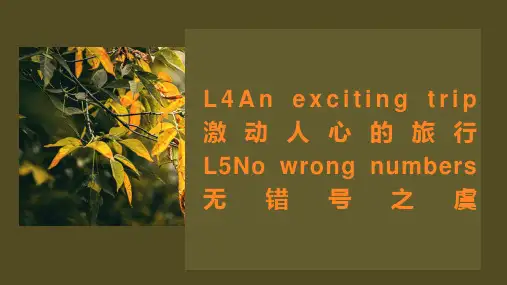

1. b根据课文的实际内容,可以推断只有b.had found Sam’swallet andkeptit是课文暗示的真实情况。
a. hadstolen Sam’swallet 不够确切,因为课文中的意思是Sam wassure thatthewallet must have been foundby oneo fthe villagers(山姆确信那钱包是被某个村民捡到了,而不是偷走了);c. hadlostSam’swallet 与课文的意思相反;d. had takenthe walle tfromSam’spocket不是课文提及的内容。
2. d根据课文所描述的情况,只有d. returnedall the money 与课文事实相符,其他3个选择都与事实不符。
3. aa. when,b. while,c. as 和d. just as都可以做连词,引导时间从句,表示“当……时”,本句只能选a.在前半句是过去进行时,后半句是一般过去时的情况下,中间多用when,表示两个动作同时发生,“正当……时”,而后3个选择引导的时间从句大都是进行时态。
4. b本句只有选b. in 意思才讲得通。
Hekeepshis savings in the post office.(他把存款放在邮局保管)。
本句中的动词keep(存放,保管)不是表示“去向”的,所以不能选a. to (到)和d. into(进入),c. on (在……上面)也不合乎题目意思,不能用on the postoffice.而应该是inthe postoffice.(在邮局里),所以选b.5. b本句是一个被动语态句。
只有b. by 表示“被”的意思,最符合语法和题目意思。
a. from , c. outof, d.of 都没有“被”的意思,所以都不对。
6.d本句是一个特殊疑问句,针对介词in的宾语提问的,回答是Anewspaper. a. where是询问地点的;b.who 是针对主语(人)提问的;c. how 是询问状态。

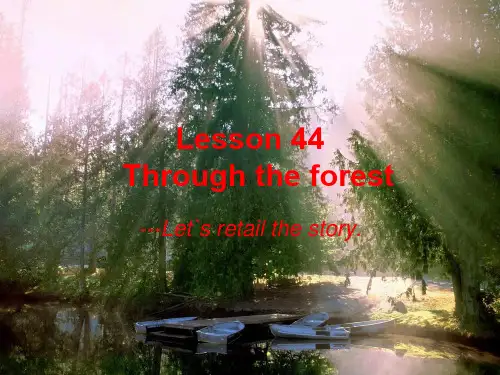

1.without doing sth.没有做某事2.catch up with sb. 追上某人3.Reading is my favourite hobby.阅读是我最喜欢的爱好4.run after追逐,追赶5. run through the park跑着穿过公园6. run straight at the man直冲向这个人7.run away逃跑8.at the edge of 在…的边上9. in their possession归他们所有10.take the risk 冒险11.out of breath气喘吁吁12.continue to do sth. 继续做某事13.go through 浏览,翻看14.get a fright下了一Lesson 45 clear conscienceclear adj.无罪的,不亏心的conscience n.良心,道德心whole 全部的sum 金额,一笔,总结Sam Benton 萨姆·本顿butcher n.屠户wallet n.皮夹,钱夹savings n.存款villager n.村民per cent (percent) 百分之…Phrases:1.the whole village整个村子2. a large sum of money一大笔钱3.be sure (that )确信4.return sth to sb. 把某物归还某人5.wrap up包裹6.in time及时;最后,终于7.pay back 归还8.in this way以这种方式9.have the conscience to do sth.厚着脸皮做某事in all conscience凭良心说a bad conscience 问心有愧10. a large sum of money 一大笔钱11.steal sth. from sb. 从某人那里偷来某物12. sum up计算,总结*clear(1)清澈的,透明的;(皮肤)洁净的We could see fish in the clear water.我们看到清澈的水中有鱼。

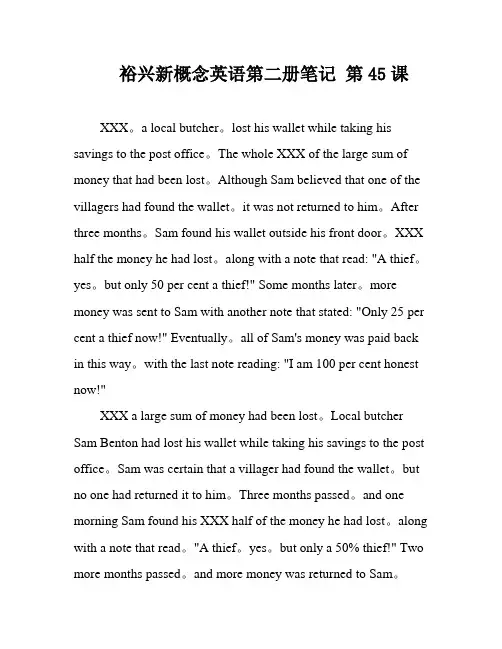
裕兴新概念英语第二册笔记第45课XXX。
a local butcher。
lost his wallet while taking his savings to the post office。
The whole XXX of the large sum of money that had been lost。
Although Sam believed that one of the villagers had found the wallet。
it was not returned to him。
After three months。
Sam found his wallet outside his front door。
XXX half the money he had lost。
along with a note that read: "A thief。
yes。
but only 50 per cent a thief!" Some months later。
more money was sent to Sam with another note that stated: "Only 25 per cent a thief now!" Eventually。
all of Sam's money was paid back in this way。
with the last note reading: "I am 100 per cent honest now!"XXX a large sum of money had been lost。
Local butcher Sam Benton had lost his wallet while taking his savings to the post office。
Sam was certain that a villager had found the wallet。
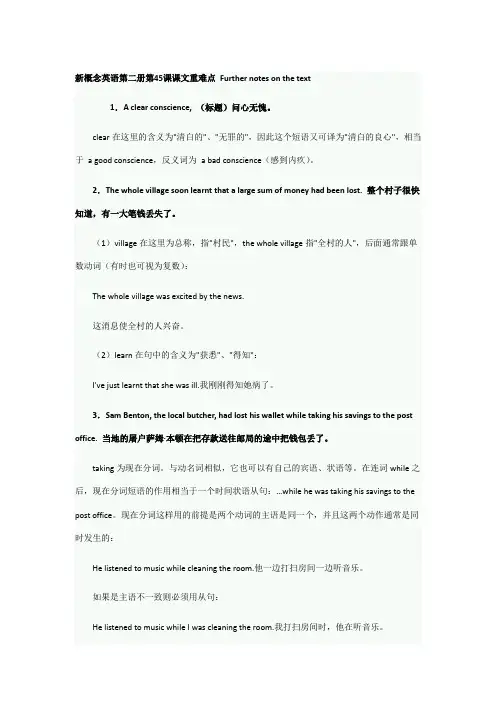
新概念英语第二册第45课课文重难点Further notes on the text1.A clear conscience, (标题)问心无愧。
clear在这里的含义为"清白的"、"无罪的",因此这个短语又可译为"清白的良心",相当于a good conscience,反义词为a bad conscience(感到内疚)。
2.The whole village soon learnt that a large sum of money had been lost. 整个村子很快知道,有一大笔钱丢失了。
(1)village在这里为总称,指"村民",the whole village指"全村的人",后面通常跟单数动词(有时也可视为复数):The whole village was excited by the news.这消息使全村的人兴奋。
(2)learn在句中的含义为"获悉"、"得知":I've just learnt that she was ill.我刚刚得知她病了。
3.Sam Benton, the local butcher, had lost his wallet while taking his savings to the post office. 当地的屠户萨姆·本顿在把存款送往邮局的途中把钱包丢了。
taking为现在分词。
与动名词相似,它也可以有自己的宾语、状语等。
在连词while之后,现在分词短语的作用相当于一个时间状语从句:…while he was taking his savings to the post office。
现在分词这样用的前提是两个动词的主语是同一个,并且这两个动作通常是同时发生的:He listened to music while cleaning the room.他一边打扫房间一边听音乐。

新概念英语第⼆册课后习题 Lesson 45 1. b 根据课⽂的实际内容,可以推断只有b. had found Sam’s wallet and kept it 是课⽂暗⽰的真实情况。
a. had stolen Sam’s wallet 不够确切,因为课⽂中的意思是Sam was sure that the wallet must have been found by one of the villagers (⼭姆确信那钱包是被某个村民捡到了,⽽不是偷⾛了);c. had lost Sam’s wallet 与课⽂的意思相反;d. had taken the wallet from Sam’s pocket 不是课⽂提及的内容。
2. d 根据课⽂所描述的情况,只有d. returned all the money 与课⽂事实相符,其他3个选择都与事实不符。
3. aa. when,b. while,c. as 和d. just as 都可以做连词,引导时间从句,表⽰“当……时”,本句只能选a. 在前半句是过去进⾏时,后半句是⼀般过去时的情况下,中间多⽤when,表⽰两个动作同时发⽣,“正当……时”,⽽后3个选择引导的时间从句⼤都是进⾏时态。
4. b 本句只有选b. in 意思才讲得通。
He keeps his savings in the post office.(他把存款放在邮局保管)。
本句中的动词keep(存放,保管)不是表⽰“去向”的,所以不能选a. to (到)和d. into(进⼊),c. on(在……上⾯)也不合乎题⽬意思,不能⽤on the post office. ⽽应该是in the post office.(在邮局⾥),所以选b. 5. b 本句是⼀个被动语态句。
只有b. by 表⽰“被”的意思,最符合语法和题⽬意思。
a. from , c. out of, d. of 都没有“被”的意思,所以都不对。
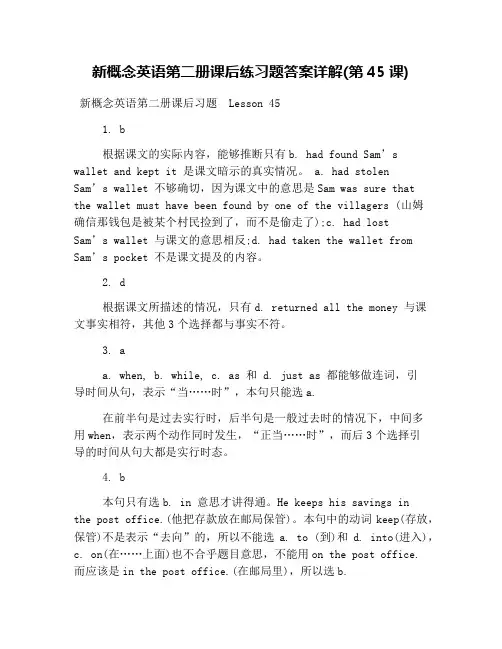
新概念英语第二册课后练习题答案详解(第45课)新概念英语第二册课后习题Lesson 451. b根据课文的实际内容,能够推断只有b. had found Sam’swallet and kept it 是课文暗示的真实情况。
a. had stolenSam’s wallet 不够确切,因为课文中的意思是Sam was sure that the wallet must have been found by one of the villagers (山姆确信那钱包是被某个村民捡到了,而不是偷走了);c. had lostSam’s wallet 与课文的意思相反;d. had taken the wallet from Sam’s pocket 不是课文提及的内容。
2. d根据课文所描述的情况,只有d. returned all the money 与课文事实相符,其他3个选择都与事实不符。
3. aa. when,b. while,c. as 和d. just as 都能够做连词,引导时间从句,表示“当……时”,本句只能选a.在前半句是过去实行时,后半句是一般过去时的情况下,中间多用when,表示两个动作同时发生,“正当……时”,而后3个选择引导的时间从句大都是实行时态。
4. b本句只有选b. in 意思才讲得通。
He keeps his savings inthe post office.(他把存款放在邮局保管)。
本句中的动词keep(存放,保管)不是表示“去向”的,所以不能选a. to (到)和d. into(进入),c. on(在……上面)也不合乎题目意思,不能用on the post office. 而应该是in the post office.(在邮局里),所以选b.5. b本句是一个被动语态句。
只有b. by 表示“被”的意思,最符合语法和题目意思。
a. from , c. out of, d. of 都没有“被”的意思,所以都不对。
新概念英语第二册课后答案第四十五课Lesson 451. b根据课文的实际内容,能够推断只有b. had found Sam’swallet and kept it 是课文暗示的真实情况。
a. had stolen Sam’s wallet 不够确切,因为课文中的意思是Sam was sure that the wallet must have been found by one of the villagers (山姆确信那钱包是被某个村民捡到了,而不是偷走了);c. had lost Sam’s wallet 与课文的意思相反;d. had taken the wallet from Sam’s pocket 不是课文提及的内容。
2. d根据课文所描述的情况,只有d. returned all the money 与课文事实相符,其他3个选择都与事实不符。
3. aa. when,b. while,c. as 和d. just as 都能够做连词,引导时间从句,表示“当……时”,本句只能选a.在前半句是过去实行时,后半句是一般过去时的情况下,中间多用when,表示两个动作同时发生,“正当……时”,而后3个选择引导的时间从句大都是实行时态。
4. b本句只有选b. in 意思才讲得通。
He keeps his savings in the post office.(他把存款放在邮局保管)。
本句中的动词keep(存放,保管)不是表示“去向”的,所以不能选a. to (到)和d. into(进入),c. on(在……上面)也不合乎题目意思,不能用on the post office. 而应该是in the post office.(在邮局里),所以选b.5. b本句是一个被动语态句。
只有b. by 表示“被”的意思,最符合语法和题目意思。
a. from , c. out of, d. of 都没有“被”的意思,所以都不对。
新概念英语单词第二册第45课:问心无愧 clear [kl??] adj不亏心的conscience ['k?n?(?)ns] 道德心【单词扩充】conscienceless缺乏责任心的【单词搭配】have sth. on one's consaence 因为某事而内疚【单词例句】A:The matter weighed upon his conscienceA:这件事使他的良心痛苦不安。
B: But he could do nothing now.B:但是他现在什么也做不了。
wallet ['w?l?t] 皮夹,钱夹【单词扩充】exceedingly极端地,极其【单词例句】A: The extremely unfavorable business has made me very depressed.A:事情极不顺利,真让我沮丧。
B: No one can be always successful.B:人不可能总是成功。
savings ['seivi?z] 存款occur [?'k??] v.发生villager ['v?l?d??] n.村民【单词例句】A: The villagers there are very friendlyA:那儿的村民很友好。
B: Mike told me that before.B:迈克之前告诉过我。
percent [p?'sent] 百分之……【派生词】percentage百分率【单词例句】A: We hope that you'll be initiativeand bridge the gap.A:我们希望你方主动来弥合差别。
B: Well, we'1l reduce the price by 5 percent.I hope this sets the ball rolling。
B:好吧。
A clear conscience问心无愧-新概念英语第二册自学导读笔记第45课新概念英语第二册第45课课文重难点 further notes on the text1.a clear conscience, (标题)问心无愧。
clear在这里的含义为"清白的"、"无罪的",所以这个短语又可译为"清白的良心",相当于 a good conscience,反义词为 a bad conscience(感到内疚)。
2.the whole village soon learnt that a large sum of money had been lost. 整个村子很快知道,有一大笔钱丢失了。
(1)village在这里为总称,指"村民",the whole village指"全村的人",后面通常跟单数动词(有时也可视为复数):the whole village was excited by the news.这消息使全村的人兴奋。
(2)learn在句中的含义为"获悉"、"得知":i've just learnt that she was ill.我刚刚得知她病了。
3.sam benton, the local butcher, had lost his wallet while taking his savings to the post office. 当地的屠户萨姆·本顿在把存款送往邮局的途中把钱包丢了。
taking为现在分词。
与动名词相似,它也能够有自己的宾语、状语等。
在连词while之后,现在分词短语的作用相当于一个时间状语从句:…while he was taking his savings to the post office。
现在分词这样用的前提是两个动词的主语是同一个,并且这两个动作通常是同时发生的:he listened to music while cleaning the room.他一边打扫房间一边听音乐。
Lesson 45 A clear conscience问心无愧How did Sam get his money back?The whole village soon learnt that a large sum of money had been lost. Sam Benton, the local butcher, had lost his wallet while taking his savings to the post office. Sam was sure that the wallet must have been found by one of the villagers, but it was not returned to him. Three months passed, and then one morning, Sam found his wallet outside his front door. It had been wrapped up in newspaper and it contained half the money he had lost, together with a note which said: 'A thief, yes, but only 50 per cent a thief!' Two months later, some more money was sent to Sam with another note: 'Only 25 per cent a thief now!' In time, all Sam's money was paid back in this way. The last note said: 'I am 100 per cent honest now!'参考译文整个村子很快知道,有一大笔钱丧失了。